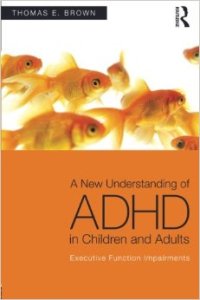by: Â Thomas E. Brown



A new model of ADHD proposed by Thomas Brown, Associate Director of the Yale Clinic for Attention and Related Disorders in Yale’s Dept. of Psychiatry, explains why individuals with ADHD can focus very well for a few specific activities that strongly interest them or which threaten imminent unpleasantness, even though they have chronic difficulties in focusing for most other tasks, including some they recognize as important.
Many who know persons with ADHD, even some professionals, assume that individuals with ADHD simply need to exercise “willpower†to make themselves apply their ability to focus in other areas where they need it. Brown uses research data to explain that ADHD is not due to lack of willpower any more than is erectile dysfunction. He presents recent research showing that ADHD impairments are actually due to problems in development of the brain’s management system, its executive functions.


Utilizing recent neuroscience research, Brown’s new model of ADHD explains findings showing that persons with ADHD tend to suffer from:
His model also emphasizes that most of the cognitive functions impaired in ADHD operate with automaticity, without conscious control.
A New Understanding of ADHD in Children and Adults: Executive Function Impairments” can be ordered now by clicking here.
Dr. Brown’s website cab be reached at: DrThomasEBrown.com
Reprinted with permission. All rights reserved.
To view HUNDREDS of articles and videos on ADD/ADHD, go to addrc.org
For more information on coaching, please visit: addcoaching.nyc
support@addrc.org 646/205.8080
Shift your focus from specific tasks you complete, like writing code, creating briefs, drafting product…
This article explores the origins of this misconception, what the research actually says, and how…
When parents are not aligned, children with ADHD may exploit inconsistencies—intentionally or not—to avoid tasks,…
By 2025 and 2026, new ADHD treatments will offer more effective symptom management, fewer side…
Receiving a long list of concerns or criticisms about your child from their school can…
This article dives into the science behind ADHD inheritance, breaking down the genetic and environmental…